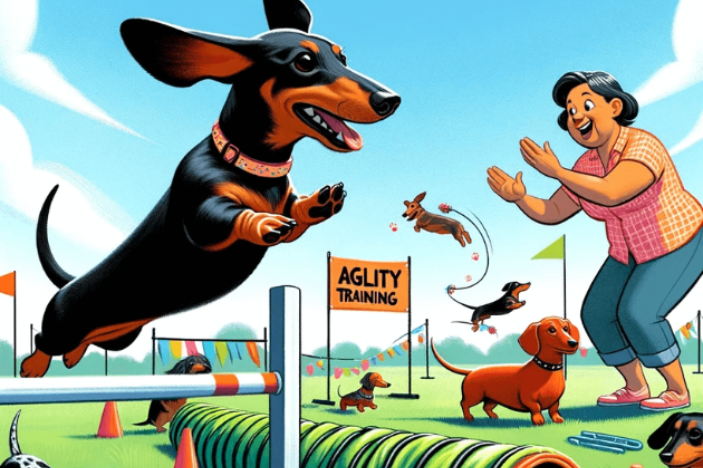Dachshunds, like all dogs, can become pregnant if they mate with a male dog during their heat cycle. The gestation period for Dachshunds is typically around 63 days. During this time, the Dachshund will experience physical and behavioral changes.
Some signs of pregnancy in Dachshunds
- Swollen nipples
- Nesting behavior
- Lethargy
- Milk production
- Racing heart rate.
- Enlarged abdomen
- Behavioral changes
- A decrease in appetite.
- Restlessness or chewing on objects.
- Increased affection toward their owner
- A noticeable increase in urination and bowel movements.
- Weight gain, especially around the stomach and elsewhere on the body
- Appetite changes during the early stages of development (pre-implantation).
- Increased panting or gasping when exercise is attempted.
It’s important to provide your pregnant Dachshund with proper care and nutrition, including regular vet checkups and a balanced diet.
It’s also important to monitor her closely for any signs of complications during pregnancy or delivery, such as difficult labor or infections.
If you have any concerns or questions about your Dachshund’s pregnancy, consult with your veterinarian.
Pregnant dachshund belly
A pregnant Dachshund’s belly will start to increase in size as the pregnancy progresses. As a general rule, Dachshunds tend to have a small litter, so the belly will not be as large as it would be for a larger breed dog.
During the first few weeks of pregnancy, you may not notice much of a difference in the size of the Dachshund’s belly.
However, as the pregnancy progresses, the belly will become more noticeable and will start to feel firm to the touch.
It’s important to note that while a pregnant Dachshund’s belly will increase in size, it should not become excessively large or distended.
If you notice that your Dachshund’s belly is very large or if you have any concerns about her health during pregnancy, it’s important to speak with a veterinarian for advice.
1-month pregnant Dachshund
Dachshunds are a small breed of dog, and pregnancy typically lasts for around 63 days or nine weeks. If your Dachshund is one month pregnant, it means that she has just been fertilized and the embryos have started to develop.
At this stage, it’s important to make sure that your Dachshund receives proper nutrition and care. You should consult with a veterinarian who can give you advice on how to properly care for your pregnant Dachshund, including dietary recommendations and exercise guidelines.
It’s also important to monitor your Dachshund’s health throughout the pregnancy, as complications can arise. Signs of potential problems can include lethargy, loss of appetite, or any unusual behavior. If you notice any of these symptoms, you should consult with a veterinarian immediately.
What is the best age to raise a Dachshund?
Dachshunds can make wonderful pets and companions, and they can adapt well to different lifestyles and living situations. The best age to raise a Dachshund would depend on several factors, including your personal preferences and lifestyle.
If you are looking for a puppy, the best age to get a Dachshund would be at least 8 weeks old. At this age, the puppy will have had some basic socialization and training from the breeder and will be ready to begin learning and bonding with its new family.
If you are interested in adopting an adult Dachshund, the best age would depend on the individual dog’s personality, temperament, and history.
Many adult Dachshunds can make wonderful pets, and may already be house-trained and well-behaved. However, some may have behavioral or health issues that require special attention and care.
Ultimately, the best age to raise a Dachshund would depend on your personal preferences and ability to provide the necessary care and attention. It’s important to do your research and consider all factors before bringing any dog into your home.
What should I feed my pregnant Dachshund?
It is important to provide your pregnant Dachshund with a balanced and nutritious diet to ensure her health and the health of her puppies.
Here are some general guidelines:
Consult with your veterinarian: Your vet can provide specific advice on what and how much to feed your pregnant Dachshund based on her individual needs.
Feed a high-quality dog food: Look for dog food that is specifically formulated for pregnant and nursing dogs. It should contain adequate protein, fat, vitamins, vegetables, and minerals.
Increase the amount of food gradually: As your Dachshund’s pregnancy progresses, she will need more calories to support the growth of her puppies.
Feed small, frequent meals: Pregnant dogs may experience nausea or vomiting, and small, frequent meals can help alleviate these symptoms.
Provide plenty of fresh water: Pregnant dogs need plenty of fresh water to stay hydrated and support the growth of their puppies.
Avoid giving supplements without consulting your veterinarian: Some supplements can be harmful to pregnant dogs and their puppies, so it’s important to consult with your vet before giving any supplements.
Monitor your Dachshund’s weight: Pregnant dogs should gain weight gradually throughout their pregnancy. Overfeeding can lead to excessive weight gain, which can cause health problems for your Dachshund and her puppies.
Remember to provide your Dachshund with plenty of love and attention during her pregnancy. Regular veterinary check-ups can also help ensure the health of both your Dachshund and her puppies.
What should I do when my dog is pregnant for the first time?
First of all, Take your dog to the vet It’s important to have your dog examined by a veterinarian as soon as you suspect she is pregnant. The vet will be able to confirm the pregnancy and give you advice on how to care for your dog throughout the pregnancy.
Here are some things you can do.
- Provide a comfortable space: Your pregnant dog will need a comfortable, clean, and warm space to rest and sleep. You can provide a cozy bed with soft blankets or a crate lined with bedding.
- Adjust her diet: Your dog’s nutritional needs will change during pregnancy, so it’s important to feed her a high-quality, nutrient-rich diet. Your vet can recommend a suitable diet or supplements to ensure your dog gets the nutrients she needs.
- Exercise and playtime: It’s important to keep your pregnant dog active with regular exercise and playtime. However, be sure to avoid over-exercising or strenuous activities that could harm the pregnancy.
- Keep her stress-free: Stress can hurt your dog’s health and pregnancy, so it’s important to keep her stress-free. Provide a calm and peaceful environment for your dog, and avoid loud noises or stressful situations.
- Be prepared for the birth: Make sure you have everything you need for the birth, including a whelping box, clean towels, and a thermometer. You should also have a plan in place in case of an emergency or if you need to take your dog to the vet.
Remember, if you have any concerns or questions about your dog’s pregnancy, don’t hesitate to contact your veterinarian for advice and support
Which type of complications do dachshunds face in pregnancy?
Dachshunds, like all dogs, can experience complications during pregnancy and delivery. Some of the potential complications that dachshunds may face during pregnancy include:
- Pregnancy toxemia (high blood pressure during pregnancy) is the most common complication when the mother’s kidneys cannot filter out toxins effectively. this is a condition that can occur late in pregnancy and is caused by a buildup of toxins in the bloodstream. It can cause a range of symptoms, including lethargy, loss of appetite, and seizures
- Gastrointestinal problems (constipation, vomiting, diarrhea) may arise due to dietary changes or stress caused by the new arrival in the household.
- Gestational diabetes: Dachshunds, like humans, can develop diabetes during pregnancy. This condition can cause a range of problems for both the mother and the puppies, including stillbirth, low birth weight, and birth defects.
- Dystocia: This refers to difficulties during labor and delivery. Dachshunds, with their long, narrow bodies, may have difficulty delivering their puppies. This can lead to the need for a C-section or other interventions.
- Pregnancy toxemia: This is a condition that can occur late in pregnancy and is caused by a buildup of toxins in the bloodstream. It can cause a range of symptoms, including lethargy, loss of appetite, and seizures.
- Mastitis: This is an infection of the mammary glands that can occur after delivery. It can cause fever, pain, and swelling in the affected area.
- Retained placenta: Occasionally, a dachshund may not expel all of the placentae after giving birth. This can cause infection and other complications.
It’s important to monitor your dachshund closely during pregnancy and consult with a veterinarian if you notice any unusual symptoms or behaviors. A veterinarian can also guide prenatal care, delivery, and postnatal care to help ensure the health and safety of both the mother and her puppies.
How might I know if my Dachshund is pregnant at home?
The easiest way to determine if your Dachshund is pregnant at home is by considering her typical behavior. If she frequently spends more time inside than out, or she has difficulty getting up from sitting or lying down, she may be in the early stages of pregnancy. You can also try taking her to a veterinarian for an ultrasound examination to confirm the pregnancy.
Do pregnant dogs have trouble walking?
Pregnant dogs may experience some difficulty walking as their pregnancy progresses, especially during the later stages of gestation. This is because the growing uterus puts pressure on the dog’s organs and can shift her center of gravity, making it more difficult for her to maintain her balance and move around comfortably.
Additionally, some pregnant dogs may experience joint pain or stiffness due to the increased weight they are carrying, which can make walking more challenging.
However, it’s important to note that not all pregnant dogs will have trouble walking. Some may show no signs of discomfort or difficulty throughout their pregnancy.
If you have concerns about your pregnant dog’s mobility or overall health, it’s always best to consult with a veterinarian for advice and guidance
Do dachshunds need C-sections?
Dachshunds, like all dog breeds, can sometimes require a cesarean section (C-section) to deliver their puppies safely. However, there is no definitive answer as to whether or not all dachshunds need C-sections.
Dachshunds are a breed with a long, narrow body shape, and this body type can increase the risk of complications during pregnancy and delivery. Some dachshunds may have difficulty giving birth naturally, especially if their puppies are larger than average or if the mother has a small pelvis.
In some cases, a veterinarian may recommend a C-section for a dachshund to reduce the risk of complications and ensure a safe delivery for both the mother and her puppies. However, many dachshunds can give birth naturally without the need for a C-section.
Ultimately, the decision to perform a C-section will depend on a variety of factors, including the health of the mother and her puppies, the size and position of the puppies, and any complications that arise during labor and delivery.
If you have a pregnant dachshund, it’s important to work closely with a veterinarian to ensure the best possible outcome for your dog and her puppies
How long do dachshunds stay pregnant?
Dachshunds are pregnant for about 60 days, though the length of the pregnancy can vary depending on various factors such as weight and exercise level. The puppies will be born between 8-10 weeks old and weigh around 3 pounds.
Conclusion,
Always keep in mind that a pregnant dachshund is not different from any other dog when it comes to its health needs. While they may act differently, all signs indicate that your pup is just acting more excited than usual.
Don’t worry- you can take care of the changes by ensuring she gets enough food and water and gives birth without complications. If you have any additional questions, consult your vet before taking action!





